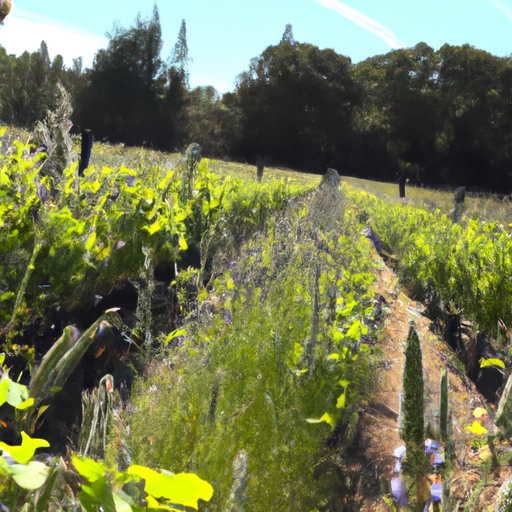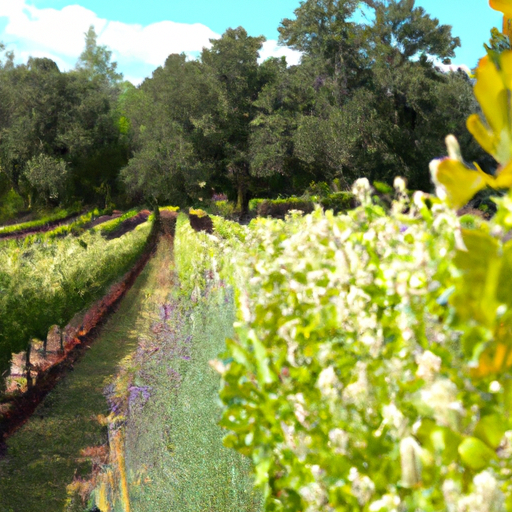
Importance of Pollinator Sanctuaries in Wineries
Pollinators play a crucial role in the ecosystem, and their importance cannot be overstated. They are responsible for the pollination of plants, which in turn leads to the production of fruits, vegetables, and nuts. Without pollinators, our food supply would be severely impacted, and the delicate balance of nature would be disrupted. Recognizing the significance of these tiny creatures, Jordan Winery has taken a commendable step by establishing the largest pollinator sanctuary for wineries.
Pollinator sanctuaries are areas specifically designed to provide a safe haven for pollinators, such as bees, butterflies, and hummingbirds. These sanctuaries are created by planting a diverse range of native plants that provide nectar and pollen, as well as shelter and nesting sites. By doing so, wineries like Jordan Winery are not only supporting the conservation of these vital species but also reaping the benefits of increased pollination in their vineyards.
The establishment of a pollinator sanctuary in a winery is particularly significant due to the close relationship between pollinators and grapevines. Grapes are self-pollinating, meaning they can reproduce without the assistance of pollinators. However, studies have shown that the presence of pollinators can enhance grape quality and yield. Bees, for example, can improve fruit set and increase the uniformity of grape clusters. This ultimately leads to better-tasting wines and higher production levels.
Furthermore, pollinator sanctuaries contribute to the overall health and biodiversity of the vineyard ecosystem. By attracting a diverse range of pollinators, these sanctuaries promote the natural balance of pests and beneficial insects. This reduces the need for chemical pesticides and fosters a more sustainable approach to vineyard management. Additionally, the presence of pollinators enhances the beauty of the vineyard, creating a more visually appealing and inviting environment for visitors.
The establishment of the largest pollinator sanctuary by Jordan Winery sets a remarkable example for other wineries to follow. It highlights the importance of taking proactive measures to protect and support pollinators, not only for the benefit of the winery but also for the greater good of the environment. By creating a sanctuary on such a large scale, Jordan Winery demonstrates its commitment to sustainability and conservation.
Moreover, the initiative taken by Jordan Winery serves as an educational opportunity for visitors and the wider community. It raises awareness about the vital role of pollinators and the threats they face, such as habitat loss and pesticide use. By showcasing the beauty and importance of these creatures, wineries can inspire others to take action and create their own pollinator sanctuaries.
In conclusion, the establishment of the largest pollinator sanctuary by Jordan Winery highlights the significance of these sanctuaries in wineries. Pollinators play a crucial role in the ecosystem and their presence can enhance grape quality and yield. Additionally, pollinator sanctuaries contribute to the overall health and biodiversity of the vineyard ecosystem, promoting a more sustainable approach to vineyard management. Jordan Winery’s initiative sets a remarkable example for other wineries to follow, inspiring them to create their own sanctuaries and contribute to the conservation of these vital species. By doing so, wineries can not only reap the benefits of increased pollination but also play a part in protecting the delicate balance of nature.
Jordan Winery’s Efforts in Conservation and Sustainability

Jordan Winery, located in Sonoma County, California, has recently made a significant contribution to conservation and sustainability efforts by establishing the largest pollinator sanctuary for wineries. This initiative is a testament to the winery’s commitment to protecting the environment and promoting biodiversity.
Pollinators, such as bees, butterflies, and birds, play a crucial role in the ecosystem by facilitating the reproduction of plants through the transfer of pollen. However, in recent years, there has been a decline in pollinator populations due to habitat loss, pesticide use, and climate change. Recognizing the importance of these creatures, Jordan Winery took it upon themselves to create a safe haven for pollinators on their property.
The pollinator sanctuary at Jordan Winery spans over 18 acres and is carefully designed to provide a diverse range of habitats for different pollinator species. The winery’s team of experts collaborated with ecologists and landscape architects to create a landscape that includes native plants, wildflowers, and flowering shrubs that attract and support pollinators throughout the year.
One of the key features of the sanctuary is the inclusion of native milkweed plants, which are essential for the survival of monarch butterflies. Monarchs rely on milkweed as their sole food source during their larval stage, and the decline of milkweed plants has contributed to the decline in monarch populations. By planting milkweed in their sanctuary, Jordan Winery is actively working to reverse this trend and provide a much-needed habitat for monarch butterflies.
In addition to providing food sources, the sanctuary also offers nesting sites and shelter for pollinators. The winery has installed bee boxes and birdhouses throughout the property, creating safe spaces for these creatures to rest and reproduce. By providing these essential resources, Jordan Winery is not only supporting pollinator populations but also promoting a healthy and balanced ecosystem.
The establishment of the pollinator sanctuary is just one of the many sustainability initiatives undertaken by Jordan Winery. The winery has long been committed to environmentally friendly practices, such as organic farming, water conservation, and renewable energy use. These efforts have earned Jordan Winery numerous accolades and certifications, including being the first winery in Sonoma County to receive the Fish Friendly Farming certification.
Furthermore, Jordan Winery actively educates visitors and the community about the importance of conservation and sustainability. They offer guided tours of the sanctuary, where visitors can learn about the role of pollinators and the steps the winery is taking to protect them. By raising awareness and sharing their knowledge, Jordan Winery hopes to inspire others to take action and make a positive impact on the environment.
In conclusion, Jordan Winery’s establishment of the largest pollinator sanctuary for wineries is a remarkable achievement in the realm of conservation and sustainability. By creating a safe haven for pollinators, the winery is not only supporting biodiversity but also contributing to the overall health of the ecosystem. Their efforts serve as an inspiration for other wineries and businesses to prioritize environmental stewardship and work towards a more sustainable future.
Benefits of Pollinator Sanctuaries for Wineries and Ecosystems
Jordan Winery, located in Sonoma County, California, has recently made headlines by establishing the largest pollinator sanctuary for wineries. This innovative initiative not only benefits the winery itself but also contributes to the preservation of local ecosystems. Pollinator sanctuaries have become increasingly popular in recent years due to their numerous benefits, and Jordan Winery is leading the way in this important conservation effort.
One of the primary benefits of pollinator sanctuaries for wineries is the positive impact they have on grape production. Bees and other pollinators play a crucial role in the fertilization of grapevines, ensuring a healthy and abundant harvest. By providing a safe and diverse habitat for these pollinators, wineries can significantly increase their crop yields and improve the quality of their wines. This is particularly important in regions like Sonoma County, where the wine industry is a vital part of the local economy.
In addition to boosting grape production, pollinator sanctuaries also contribute to the overall health and biodiversity of ecosystems. Bees, butterflies, and other pollinators are essential for the reproduction of flowering plants, including many wildflowers and native species. By creating a sanctuary that offers a variety of flowering plants, Jordan Winery is not only supporting its own grapevines but also providing a vital habitat for these important pollinators. This, in turn, helps to maintain the delicate balance of the local ecosystem and promotes the survival of native plant species.
Furthermore, pollinator sanctuaries have a positive impact on the surrounding environment by reducing the need for chemical pesticides. By attracting beneficial insects like ladybugs and lacewings, which feed on harmful pests, wineries can naturally control pest populations without resorting to harmful chemicals. This not only protects the health of the pollinators but also reduces the risk of pesticide contamination in the soil and water. Jordan Winery’s commitment to creating a pollinator sanctuary demonstrates their dedication to sustainable and environmentally friendly practices.
Another benefit of pollinator sanctuaries is their potential to attract visitors and enhance the overall experience for wine enthusiasts. Many wineries have recognized the value of creating beautiful and inviting spaces for visitors to enjoy. By incorporating pollinator gardens into their landscapes, wineries can provide a unique and educational experience for guests. Visitors can learn about the importance of pollinators, witness the fascinating process of pollination firsthand, and even participate in activities like beekeeping workshops. This not only adds value to the winery experience but also raises awareness about the importance of pollinator conservation.
In conclusion, the establishment of the largest pollinator sanctuary for wineries by Jordan Winery is a significant step towards promoting sustainable practices and preserving local ecosystems. Pollinator sanctuaries offer numerous benefits, including increased grape production, enhanced biodiversity, reduced pesticide use, and an improved visitor experience. By creating a safe haven for pollinators, wineries like Jordan Winery are not only ensuring the success of their own crops but also contributing to the overall health and vitality of the environment. This initiative serves as an inspiration for other wineries and businesses to prioritize pollinator conservation and work towards a more sustainable future.






